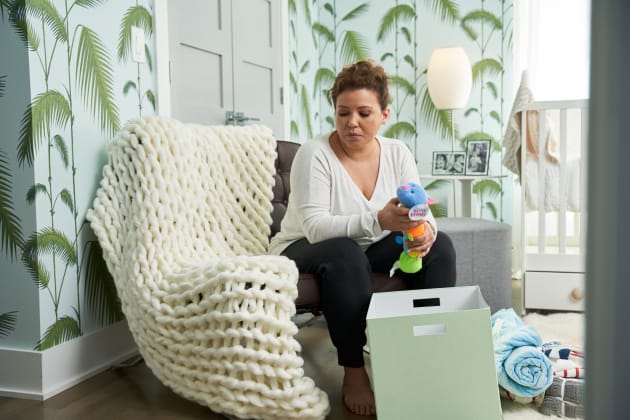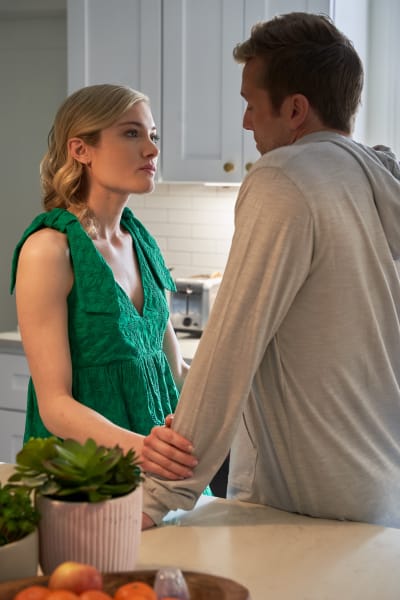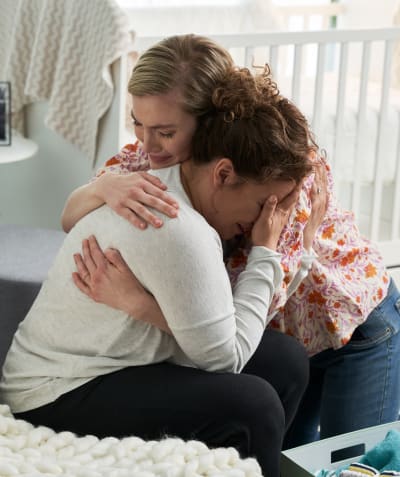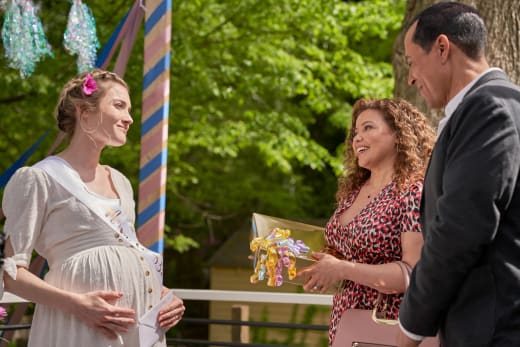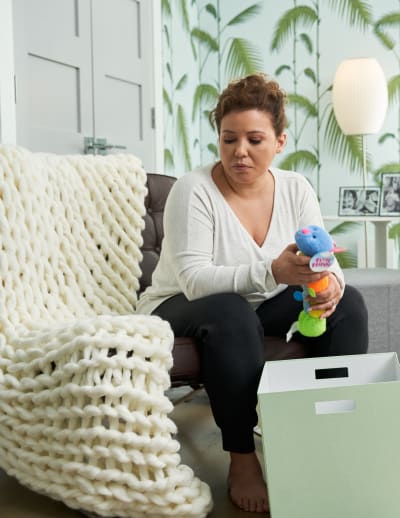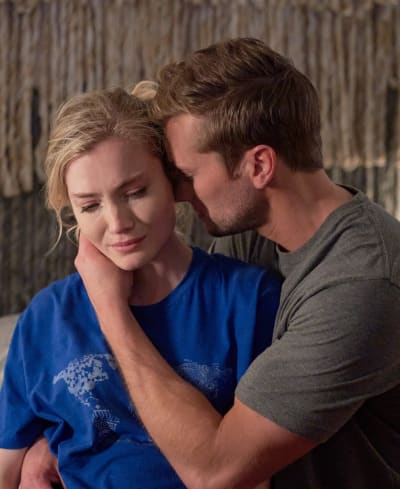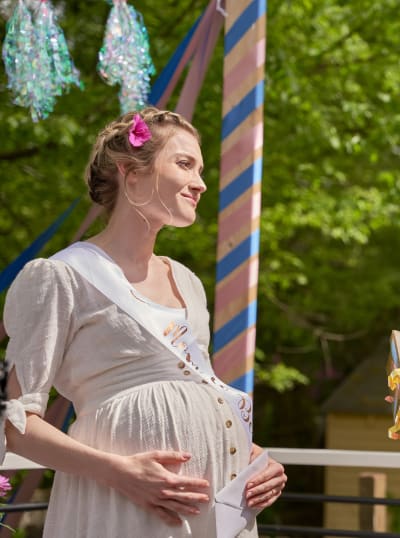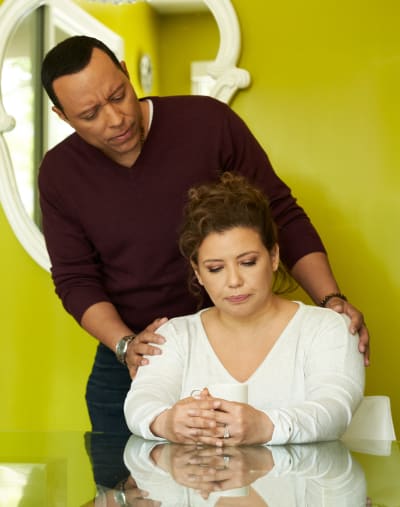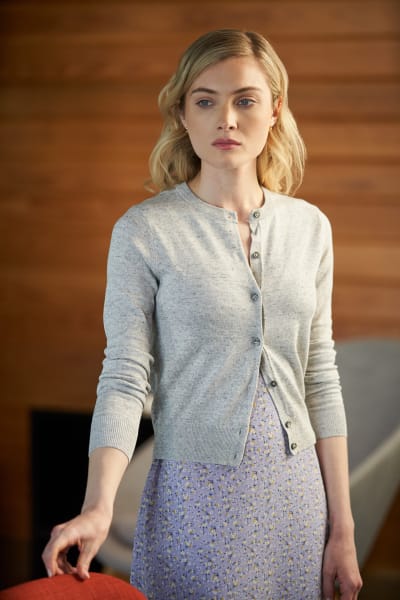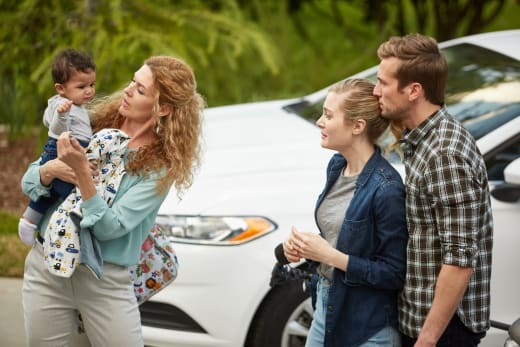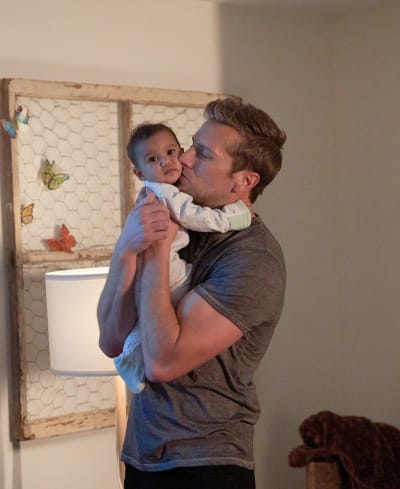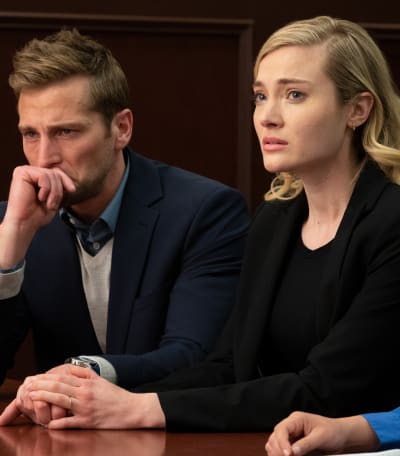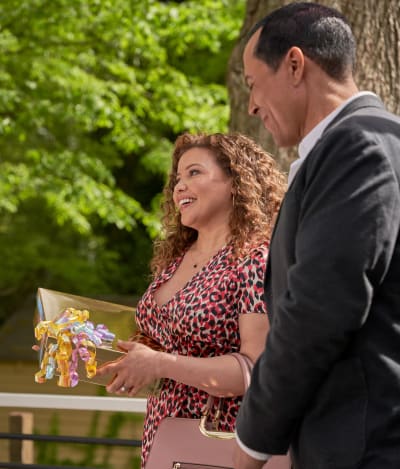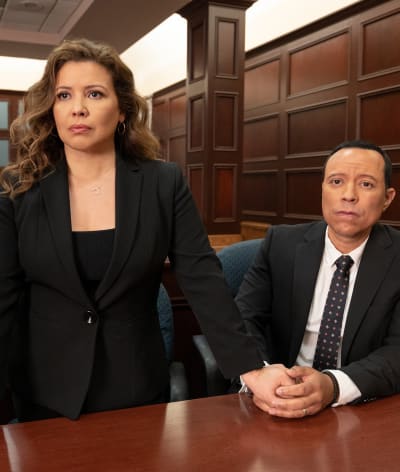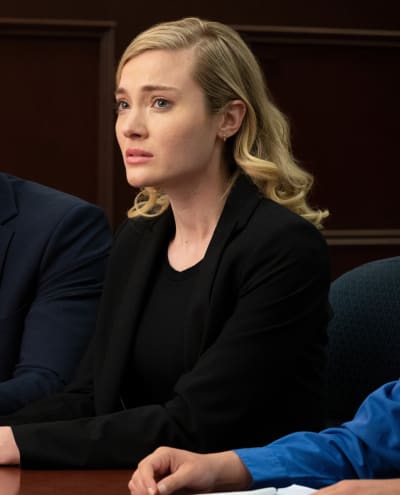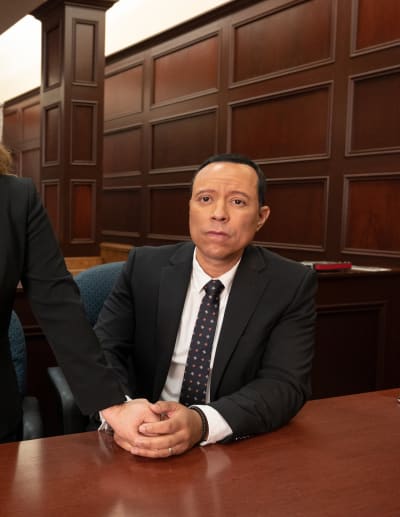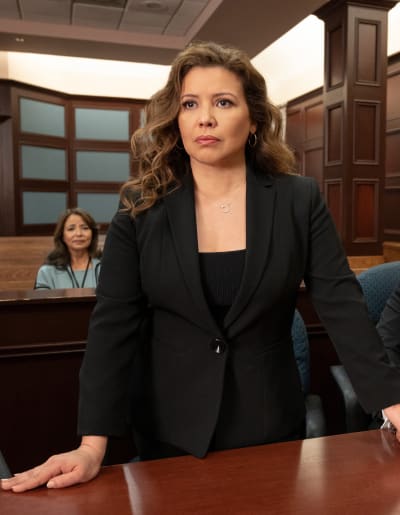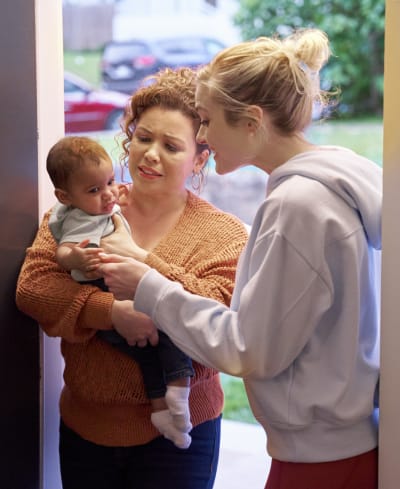Anna Ramirez is a better person than I could ever dream of being.
Lifetime brought all the angst, drama, and high emotions with Switched Before Birth, in which real tales of IVF inspired the film, and it served as a rallying cry for why the procedure desperately needs federal regulation.
It could spare so much heartache and harm.
Lifetime veteran Elisabeth Röhm worked her magic behind the scenes directing as Switched Before Birth saw her reunited with former Family Pictures costar Justina Machado.
Machado and Samuels, our two leading ladies, brought so much to these roles. You could feel their anguish, anger, grief, and more as we followed their journeys from expressing the difficulties of infertility to fighting each other for their son. They were phenomenal.
Infertility is such a heartwrenching disease, and it doesn’t get the same weight as many other things.
Switched Before Birth wonderfully showcased the emotional and physical toll it takes on those who suffer from it.
By honing in on the severity of infertility, plight, and each woman’s history with it, the perfect amount of context made the ongoing battle between these friends over baby Sam rich and complex.
After all, as much as we probably had our sides to take during the ordeal, it wasn’t as clear-cut and black and white as one would believe.
It was essential to spend a significant amount of time on both women, building up their friendship. The fact that we didn’t delve into the custody battle portion of the film sooner –which is where all the real action, drama, and spectacle happened –was a surprise.
The promotions for this film would’ve given most the impression that these were two strangers finding out about an embryo mishap at the fertility clinic and fighting each other for custody of their child.
Anna and Olivia’s months to yearlong friendship before their lives getting upended by this shocking news made the situation more difficult than ever to watch but all the more entertaining.
The two women built such a seemingly solid, robust, and genuine friendship from the day they met each other and started talking at the same clinic that screwed them over.
It was a fast friendship rooted in their personal experiences with infertility and the desire and longing for children.
Their friendship was more intimate and vulnerable than most, and quickly at that, as they immersed themselves in each other’s lives and became something akin to sisters.
Gabe and Brian were fast friends, too. It was a bond that the movie didn’t spend nearly as much time exploring. Nevertheless, Arias and Yokely played off one another well and excelled in supportive roles to the leading ladies.
But the two of them having a conversation about grieving their wives’ miscarriages and navigating the pain of the women they love while sorting through their own was one of the most emotionally cathartic scenes of the film.
The two couples became so inextricably linked with one another that they felt like family. And it made the couples’ embarking on the IVF journeys at the same time endearing.
However, it also was foreboding as we all knew something would shatter their worlds and that mutual journey of happiness would come to an end.
The second Anna and Olivia switched their appointments around to accommodate Brian’s delay — it was apparent that one maneuver would change everything for them.
Surprisingly, it took a minute to get to the clinic’s faux pas, and the excitement over Olivia and Anna finding out that they were both pregnant surpassed everything else.
They were precious together, shopping for baby clothes and spending time with their families as one. It must’ve felt good to finally get that win and share the experience with someone equally as deserving.
But Anna’s miscarriage changed everything. It was such a devastating scene when she realized what was happening.
Despite knowing Anna loved and cared about Olivia, the seeds of strife sowed when Anna had to look at her pregnant best friend, attend baby showers, and have a constant reminder that her journey had to end ahead of Olivia’s and in such a tragic manner.
Of the two women, Anna was the most compelling. The miscarriage was such a turning point in her life, and not in the best way.
She couldn’t work through her grief along with Gabe, and the more she pushed him away, the worse things got for them.
They already touched upon some intriguing hurdles when Gabe learned that his sperm was the reason they couldn’t have kids and carried around blame because of it.
Do you think he would’ve relented to a donor if he didn’t blame himself for their infertility?
Anna was the first to point out that Gabe didn’t have to be the biological father of their child to serve as a dad. And when his wife’s love for him settled in, he heeded her words often.
But the second they lost their child, Anna used Gabe’s lack of biological connection as a reason to lash out and claim he wouldn’t feel the pain she did.
It was such an ugly thing for her to say when most likely, what she was feeling pertained to her carrying their child and physically feeling the loss, something of which he couldn’t understand regardless of whether or not the baby had his DNA.
That coupled with Anna’s assumption that he had an affair because of her emotional and sexual distance after the miscarriage destroyed their marriage.
From that point forward, there were elements of the movie that were disconcerting at best. The film wanted viewers to sympathize with both Anna and Oliva, and maybe it hoped we would do that equally.
However, the awful things Anna endured throughout the back half of the movie were appalling, and the woman deserves sainthood for the grace she displayed until the end.
It’s incredible how quickly someone you consider a close friend can turn on you, isn’t it?
Within reason, the Ramirezes thought Olivia and Brian would at least consider arranging something with them after the discovery. Maybe the pair taking advantage of the rapport they shared with the Crawfords was too much.
While this scenario is unthinkable, the strong friendship between the couples should’ve made it easier to navigate, not harder, especially when you consider how it ended.
By the end of the film, they were one big happy family, so it’s unfathomable that things got that damn ugly between them finding out the news and the “twins” celebrating their birthday together.
So many factors came into play, and while the situation is complex, and you cannot reduce something involving all of these human lives and feelings down to black and white, the latter seeps through anyway.
You can’t help but mull over things like how with two babies, one of whom was biologically Anna’s, both couples would have a child. It wasn’t as if Olivia only had Sam, and everyone expected her to give him up, leaving her childless.
Of course, that doesn’t mitigate her and Brian’s feelings, their bond with Sam, or anything else. And after as many miscarriages and failed treatments, understandably, the expectation that she should give up one of her presumed children is a slap in the face.
But on the flip side, it’s because of her experiences that you hoped cooler heads would prevail, and she wouldn’t want to subject her best friend to similar pains. We all know if the shoe were on the other foot, she would fight like hell for what would’ve been her only hope at the child she worked hard to get, right?
And there was the fact that Sam was visibly a brown, ethnic child. It would be one thing if Olivia and Brian were a multiracial couple. Hell, I know from personal experiences within my family how different siblings and even twins can look, including various shades.
But Olivia citing that her mother was tan, had no bearing on this visibly dark-skinned, dark curly-haired child that looked nothing like anyone in their family, let alone his sister.
It’s hard to believe that neither Olivia nor her husband questioned it once before all of this. I appreciate that their love for this child transcended race; it’s a beautiful sentiment.
But this is how utterly ridiculous it comes across when people say they’re colorblind rather than their intended sentiment that they don’t treat people differently because of their color. Was no one in their life commenting on the brown baby in the room?
It makes more sense that they knew something was off deep down. Olivia and Brian were either in denial or opting for plausible deniability to help them sleep better at night versus the mere thought that some other woman or couple got deprived of her costly shot at having a child.
It didn’t serve them sufficiently that they never questioned their son’s race early on and went four months without raising a single question. The clinic and court could’ve resolved everything sooner if they did.
Olivia spoke about how she carried Sam as if she and Brian weren’t considering surrogacy at some point and would’ve argued the opposite side another time.
She spoke about the babies being twins, but biologically, with their different DNA, they were not.
She and Brian claimed they were doing what was suitable for Sam versus the reality of them serving their self-interest. However, I question what would’ve happened in the future when little Sam wondered why he didn’t look like anyone in his family or why the world treated him differently?
It’s doubtful that a couple who turned so harshly on their friends and unwittingly exploited certain perceptions about Anna, specifically, with an unsettling fervor, would be well-equipped to have the necessary conversations with Sam when the time came.
The film attempted to frame Olivia’s perspective as a new mother of two who loved both her children fiercely and would go to whatever lengths necessary to do what was best for Sam and preserve the family she fought years to obtain.
And there was plenty there to make her sympathetic. However, with Olivia going to such slanderous lengths to vilify her best friend, Olivia came across as an entitled, passively bigoted villain when neither woman should’ve held that role.
The concept of this film is that IVF is in uncharted territories. It’s not federally regulated, and there is little precedent to work with during these types of scenarios.
The clinic’s negligence is what should’ve been in question, but with Sam’s livelihood at stake, the narrative shifted to the dreadful custody battle between the Crawfords and Ramirez couple.
Neither couple was at fault for what transpired, yet the situation compelled them to vilify each other for the sake of Sam.
But it was Anna who received the brunt of the blows, sandwiched between a husband who felt slighted and was still desperate to rekindle things with her and a best friend who weaponized everything she knew about Anna against her.
Somehow, Olivia’s anger over the situation registered as a protective mother operating in Sam’s best interest, but everyone judged Anna’s ire.
Anna was passionate and boisterous, but no one gave her space to be hurt, angry, or emotional about this unusual, rare thing she experienced.
She didn’t have access to her biological child, had to fight for custody against her best friend, and spent the entire trial having to prove to everyone that she was worthy of her child.
A case meant to determine who should legally be the parents after this mishap shifted to whether or not Anna’s character was up to par and if anyone should entrust her with a child.
Despite the lack of legal protocols in place for the situation, Olivia wasted no time employing every legal recourse she could, bending the system to her will as much as she could to garner favor. She didn’t bat an eye or ever once consider the ramifications of what she was doing and the messages she sent.
Brian was more sensible. He wanted an open line of communication and a semblance of goodwill if things didn’t work in their favor.
Olivia wanted to scorch the earth for Sam. The meeting with Anna went well until things got heated.
The second Anna raised her voice, Olivia retreated into herself. She spent the remainder of the film inciting the idea that Anna was potentially violent and threatening.
A tactic for Olivia, a genuine effort to preserve her family and protect Sam, in her mind, projected this troubling, offensive idea that Anna was some Angry Latina unfit for parenthood.
It was a far cry from the early days of their friendship when Olivia encouraged and admired Anna. When times got as rough as they possibly could get, Olivia diminished her best friend, reducing her to a series of tropes and stereotypes.
Unmistakably, Anna was angry, hurt, and lashing out at loved ones while enduring this impossibly awful situation. And she did need therapy to help her sort through her feelings and learn tools to cope better in life.
The problem was everyone acted as if she had no right to her emotions. Anna didn’t get space to process things as she deemed fit without scrutiny and judgment.
By way of the court, Olivia spent most of the trial policing Anna’s behavior and emotions. Anna had to jump through hoops and tapdance to the court’s liking to appease them, the Crawfords, and show that she was worthy.
Everyone indicted Anna for daring to want her child. It was dehumanizing and demoralizing.
From court-appointed therapy to a restraining order and supervised visitation, the Crawfords didn’t even want her to have — Anna had so many hoops she had to jump through that the other couple did not.
The judge ruling in her favor was the best outcome out of a challenging situation, but even then, the Ramirezes lost five months with their son, and Anna had to seek Olivia out for guidance on handling Sam.
After not getting to carry her son, name him, hear his first word and have it directed at her, and more, the ability to connect with Sam was difficult.
Fortunately, Anna and Gabe patched things up when she apologized and recognized how much she hurt him by pushing him away. They got their son, too.
The most remarkable part of this movie is that somehow the Crawfords and Ramirezes went back to being friends after all of this, like family even.
We got a glimpse of the “twins” slightly older as both families came together to celebrate their birthdays.
It’s everything you would’ve envisioned for them in the first place. Anna and Gabe raising their son never meant that Olivia and Brian would never see or hear from him and them again.
It never would’ve meant that the “twins” couldn’t grow up together as some form of siblings even if they resided in different households.
Their twin connection wouldn’t dissipate if they were no longer under the same roof. The ending was as it should’ve been.
However, because of how unsteady things were during that custody hearing, there’s no way on earth it felt realistic that the two families carried on as if that custody battle was water under the bridge.
Is there any going back after someone you thought you knew well and cared about attacks your character so viciously?
Despite everything Olivia knew about Anna and her journey, it was repulsive that she undermined Anna’s similar experiences with infertility and asserted that Anna was unfit as a possible mother to Sam.
How do you trust this person again? How do you not fear that the next time there’s a hardship, their entire perspective of you will shift?
The time jump bypassed the mending period between the families, and truthfully, that would’ve been even more captivating. I wish we could’ve seen how these families found their way back to this wholesome place.
But they all got their happy endings. Anna and Gabe have their son. Mia has her brother, so she hasn’t lost that. The Crawfords were expecting another child.
But Anna Ramirez needs to bottle up the grace and biblical level of forgiveness she had to have exuded to remain friends with these people.
It might be the key to global peace.
Over to you, Lifetime Fanatics.
How did you feel about this movie? Were you surprised to know that IVF still isn’t federally regulated?
How did you feel about the case and the outcome? Sound off below!
Jasmine Blu is a senior staff writer for TV Fanatic. Follow her on Twitter.
